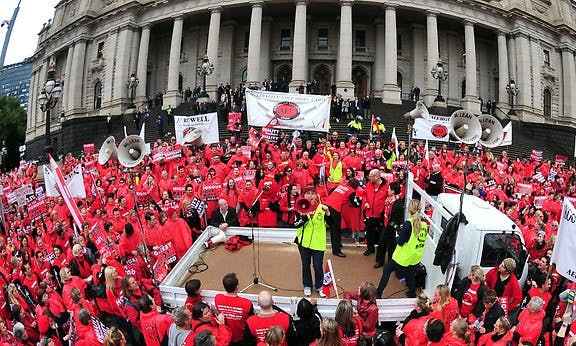Missed opportunity to tackle teacher workloads in Vic deal

Victorian teachers and school support staff stand to make fairly modest gains in the new industrial agreement between the Australian Education Union (AEU) and the Labor government. It is hardly the “great win” claimed by branch president Meredith Peace.
Teachers and support staff will get a wage rise of 13.7 percent over the life of the four-year deal, well short of what we were asking for (principals will get 17.1 percent). Daily rates for relief teachers will rise more significantly, but they will still earn less than their counterparts in other states. Some welcome initiatives include paid family violence leave, some time release for AEU reps, union training leave for all members and bans on quotas on the number of staff who can progress up the salary scale and on lump sum performance pay.
However, ask any teacher what their major concern is and the answer will be loud and clear: workloads. An independent survey commissioned by the AEU last year found that 80 percent of teachers worked an average of 53 hours per week – a whopping 15 hours of unpaid overtime. So our log of claims included a reduction in face-to-face teaching hours and a cap on class sizes. But there has been no improvement whatsoever on this front.
Instead, teachers will get four “professional practice” days per year when they are released from teaching duties for other work “directly related to teaching” such as planning, preparation, assessment, professional development and peer observation. To say this is a drop in the overall workload bucket would be an overstatement. And it will be another four years before we can address the workload issue again.
A side deal between the government and the union also means that eligible employees on fixed-term contracts will be able to get permanent employment, determined centrally (though principals will still have some say). While this is a positive development, it is not enshrined in the agreement itself, which means it cannot be enforced if, for example, there is a change of government.
Negotiations for the agreement started more than a year ago and had stalled until the union applied to Fair Work in February for a protected industrial action ballot. The government then quickly offered some concessions. The inescapable conclusion is that we could have done much better if we’d proceeded with an industrial campaign, including strikes. But the AEU leadership chose to accept what was on offer without firing a shot. Many teachers will see this as a missed opportunity.